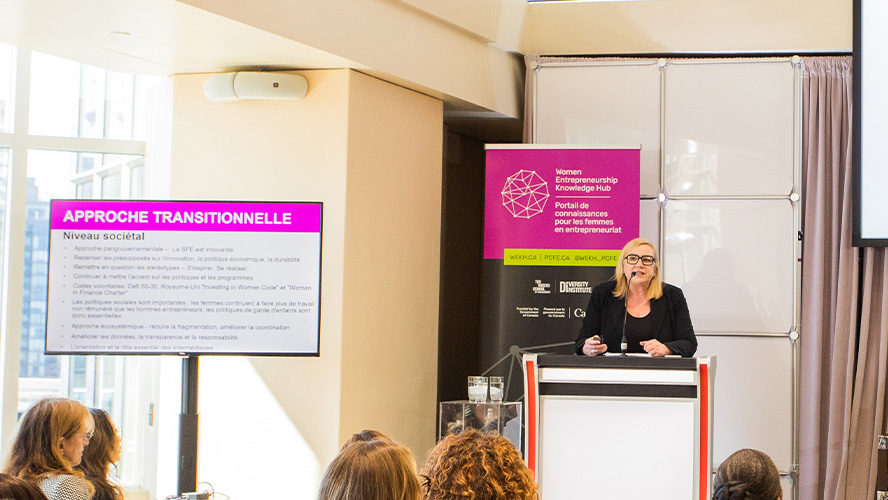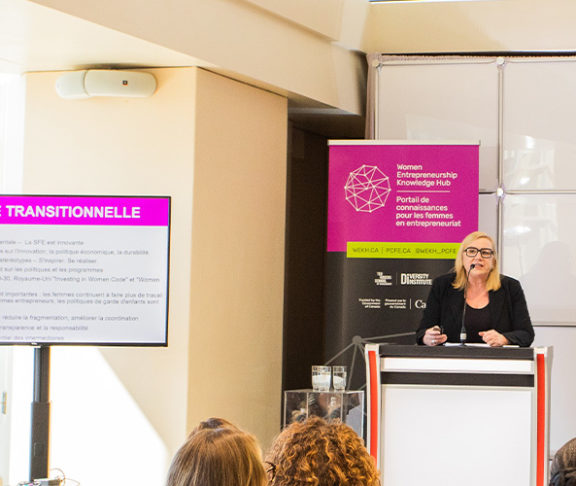Despite the devastating impacts of the COVID-19 pandemic, there is evidence that women entrepreneurs are gaining ground, according to the latest annual State of Women’s Entrepreneurship (SOWE) in Canada 2023 Research Preview, which synthesizes new research on women entrepreneurship in Canada to inform policy and practice. Although there are gaps in the data, majority women-owned businesses appear to be a growing proportion of small and medium-sized enterprises (SMEs). Averaging the quarterly Canadian Survey on Business Conditions reports, researchers at the Women Entrepreneurship Knowledge Hub (WEKH) estimate that 18 per cent of all businesses, including SMEs and large businesses, are majority owned by women in Canada (SMEs account for 99.8 per cent of these). Previous research showed that 16.8 per cent of SMEs in 2020 were majority women-owned, an increase from 15.6 per cent in 2017. Another study, from the Global Entrepreneurship Monitor, indicated that the gap between women and men in terms of entrepreneurial intent is narrowing.
Wendy Cukier, the report’s lead researcher and founder of the Diversity Institute at the Ted Rogers School of Management, said, “Despite the threat COVID-19 presented to their very survival, women entrepreneurs adapted and pivoted. Not only are they narrowing the gap with men entrepreneurs in terms of ownership of SMEs, but also in innovation and export.”
Despite the threat COVID-19 presented to their very survival, women entrepreneurs adapted and pivoted.
SMEs account for almost 90 per cent of private sector employment in Canada, compared to 50 per cent in the U.S. and this needs to inform our strategies for economic growth, innovation, sustainability, and inclusion. While large corporations tend to dominate discussions, entrepreneurs, including women entrepreneurs, are critical. We need to better understand their impact and to help them start-up and scale up their businesses. Definitions matter. Historically, a women entrepreneur was defined as a majority owner of an SME. According to that definition, in 2017, about 15.6 per cent of SMEs were majority owned by women, which translates to about 110,000 enterprises. But WEKH research showed that women entrepreneurs, as well as Indigenous and Black entrepreneurs, are less likely to incorporate their businesses. Almost 40 per cent of self-employed Canadians are women, accounting for almost one million entrepreneurs. The origin stories of women-owned SMEs are often different than those of men — often they start as self-employment or a side gig. We need to support them where they are.
There are still opportunities for improvement — the report highlights the evidence of increased barriers faced by Indigenous, racialized and Black entrepreneurs, as well as that immigrant women are more likely to be entrepreneurs than others. While it is true some newcomers are “pushed” into entrepreneurship because they are excluded from mainstream employment or face hostile work environments, many are “pulled” and would choose entrepreneurship over employment. Among South Asian entrepreneurs, for example, there is near gender parity with women representing 46.3 per cent. Women account for more than one-third (33.4 per cent) of Black entrepreneurs.

Nadine Spencer, CEO of the Black Business and Professional Association (BBPA) and a WEKH partner organization, has led research that showed that the COVID-19 pandemic hit Black businesses twice as hard as other businesses, while they had access to fewer resources needed to survive. “Thanks to the research by WEKH and investments in the Black Entrepreneurship Strategy, we are working to level the playing field,” Spencer said. “Black women face even more barriers. Yet their entrepreneurial spirit is strong. The BBPA-led ‘Rise up’ competition for Black women, for example, attracted 1,700 women vying for eight $10,000 prizes. While I am thrilled for the 24 finalists, we need to find ways to provide opportunities and support for the other 1,676 women who want to start and scale their businesses.”
Canada’s Women Entrepreneurship Strategy (WES) is unique because it brings a “whole of government” approach to supporting women. This is not just a job for Innovation, Science and Economic Development or Canada’s regional development agencies. Agriculture and Agri-Food Canada is now focused on ways to support women in farming and in agritech. Natural Resources Canada is focused on how to support women in greentech and in the businesses needed to drive toward net zero. Canada has stepped up its efforts through Procurement Assistance Canada to provide opportunities for women and other diverse entrepreneurs to access the government’s massive spending on products and services. Moreover, recent investments by WES have included targeted financing, support for ecosystem players and intermediaries, and a new program focused on creating a more inclusive venture capital sector. Programs focused on promoting technology adoption and training for entrepreneurs are more accessible to women and diverse entrepreneurs. And programs are being constantly refined to ensure they meet their goals.
More than one-half of entrepreneurs start with less than $5,000 in funding, and yet it is hard to access small grants and loans, particularly for women over the age of 30. “We need innovative programs to support women and new ways of thinking about our priorities,” said Cukier. “The tech sector is key to growth and innovation, but it’s also high risk. People think nothing of investing in high-risk technology ventures with failure rates exceeding 90 per cent, but it’s hard for some women to get even $1,000 to get their business started. We are undertaking more research to help us better understand the impact of small investments on community economic development, sustainability and inclusion.”
Cukier cautioned, “Small businesses are the engine of the economy, and when small businesses fail, our shared economy fails.”
For more information visit wekh.ca.




